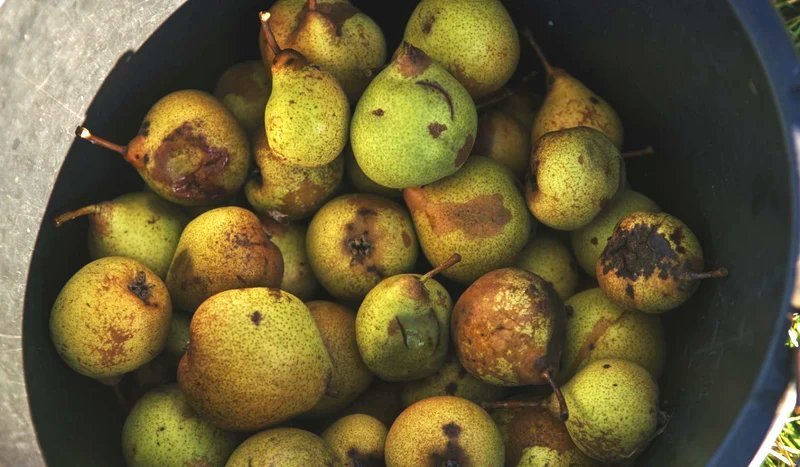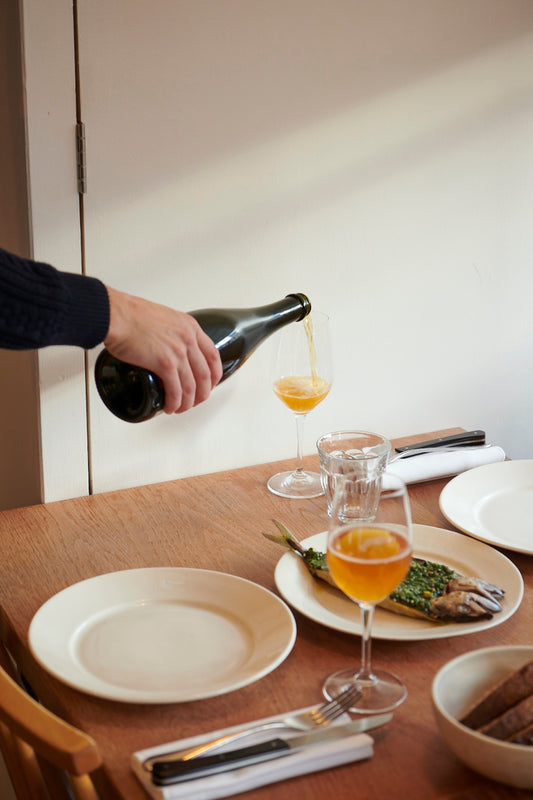
#3 - What is Perry?
Share
You may well have heard of 'perry', but not be quite sure what it is? While it certainly has a lot in common with cider and is very much a part of the same world, perry is a wonderful drink of its own!! You might know perry by its more generic name 'pear cider', and although pear cider often refers to mass market pear flavoured drinks, perry is a fair bit more special...The other simple way to explain it is that cider is made from apples, but perry is made from pears. To make perry, you press pears for their juice, and just as with cider, yeasts ferment sugars into alcohol. And just as with cider apples, there are certain varieties of pear, called perry pears, that have historically been selected and used for perry-making, owing to the wonderful perry they make!
The main problem with calling perry 'pear cider' is that cider is made with apples, and perry with pears. You can make a drink with both apples and pears, which is then called 'Pyder', a mix of the words cider and perry (although personally, we think 'Perrider' has a better ring to it...). But the other big difference is that pear cider is almost always an industrial product, made from concentrate, where as perry is almost exclusively a small batch creation, made from fresh pressed pear juice. And while it's easy to think of a few big cider brands, there aren't really any big perry companies out there today! But why? Well, making perry at a big scale is not easy, and pears are said to be far more fickle than apples to work with: pears can be ripe for as little as a few days before they rot, and unlike apples they don't float in water (which is typically how big cider makers clean and move apples around in their factories).
But for those who put in the effort at a small scale, when all goes well perry can be a marvellous thing! Napoleon Bonaparte is even said to have once called perry the 'English Champagne'. We call such perry 'fine perry', and the same complexities involved in making fine cider are also true of fine perry: from the array of styles, to the seasonal variation and the variety of flavours pears can create. And while an apple orchard can be beautiful, perry pear trees can be even more magical: perry pear trees can grow beyond 200 or even 300 years old, and can be as tall as a four storey building (meaning they are not so easy to pick...); they also bloom in early Spring, covering themselves in pure white flowers - it's an incredible sight!
One key difference between pears and apples, is that many pears contain a type of sugar called sorbitol, which doesn't ferment. So a lot of perries retain a bit of natural sweetness, meaning they tend to be, on average, slightly sweeter than cider. So perries often have an abundance of succulent floral notes, like elderflower and grapefruit!
The main problem with calling perry 'pear cider' is that cider is made with apples, and perry with pears. You can make a drink with both apples and pears, which is then called 'Pyder', a mix of the words cider and perry (although personally, we think 'Perrider' has a better ring to it...). But the other big difference is that pear cider is almost always an industrial product, made from concentrate, where as perry is almost exclusively a small batch creation, made from fresh pressed pear juice. And while it's easy to think of a few big cider brands, there aren't really any big perry companies out there today! But why? Well, making perry at a big scale is not easy, and pears are said to be far more fickle than apples to work with: pears can be ripe for as little as a few days before they rot, and unlike apples they don't float in water (which is typically how big cider makers clean and move apples around in their factories).
But for those who put in the effort at a small scale, when all goes well perry can be a marvellous thing! Napoleon Bonaparte is even said to have once called perry the 'English Champagne'. We call such perry 'fine perry', and the same complexities involved in making fine cider are also true of fine perry: from the array of styles, to the seasonal variation and the variety of flavours pears can create. And while an apple orchard can be beautiful, perry pear trees can be even more magical: perry pear trees can grow beyond 200 or even 300 years old, and can be as tall as a four storey building (meaning they are not so easy to pick...); they also bloom in early Spring, covering themselves in pure white flowers - it's an incredible sight!
One key difference between pears and apples, is that many pears contain a type of sugar called sorbitol, which doesn't ferment. So a lot of perries retain a bit of natural sweetness, meaning they tend to be, on average, slightly sweeter than cider. So perries often have an abundance of succulent floral notes, like elderflower and grapefruit!


